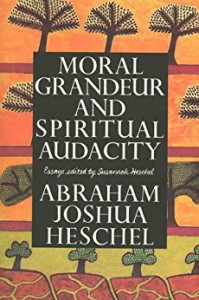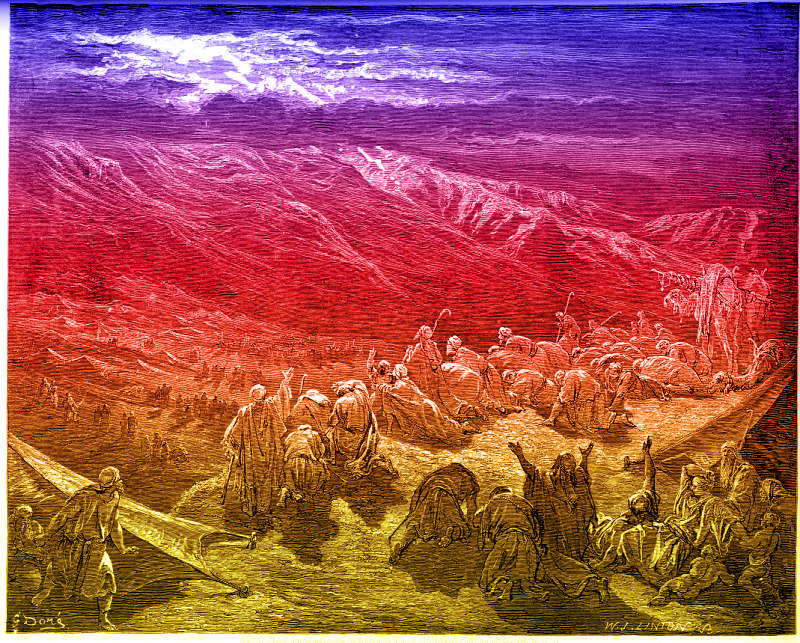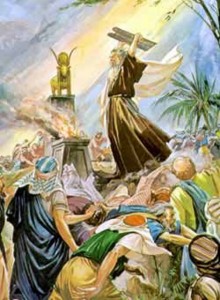 [This was first posted June 11, 2012, revisited , 2014, 2015, 2016 and deserves to be reviewed every so often.
[This was first posted June 11, 2012, revisited , 2014, 2015, 2016 and deserves to be reviewed every so often.
This is one of 40 essays written by Abraham Joshua Heschel (AJH) circa 1953, in a collection edited by his daughter Susannah Heschel, titled: Moral Grandeur and Spiritual Audacity. This book is another excellent MUST READ, in fact MJST OWN, and should be in the library of any serious student of the Hebrew Scriptures.
What AJH calls “the Bible” is only the TNK, the Hebrew Scriptures, not the Christian Bible with OT and NT. If you’re familiar with his essays, you will agree that almost every sentence is thought-provoking, memorable, in fact quotable. Only highlights of the essay are featured here.
Consider that as a Jewish philosopher, he addresses primarily the people he proudly belongs to but gentiles have much to learn and absorb from his wisdom and unique understanding of what happened on Sinai. In fact, this is the other book that was instrumental in our decision to connect with the Revelator on Sinai and choose the revelation there (Torah) as the main source of spiritual illumination and redirection of our way of life.
Where does an ex-Christian go when you don’t want to join Judaism, but still be focused on the Hebrew Scriptures, particularly the Torah of YHWH? Sinai, a neutral place chosen by the Creator to reveal Himself to a ‘mixed multitude’. Think of yourself among the ‘mix’, the gentile among Israelites, the odd-man out, but represented nevertheless on that crucial moment in biblical-historical time. Non-Israelite slaves took advantage and joined the exodus, leaving the place of bondage and idolatry to wander in the wilderness toward a Liberator who gives instructions on how to live in the world He created. The Covenant was with Israel, but the prescribed Way of life is for all nations. Gentiles represented the ‘stranger among you’ in Numbers 9:
“There shall be one law for you,
whether stranger or citizen of the country.”
The excerpts have been reformatted and highlighted for this post; consider it as though you’re reading through a Sinaite’s notes from a lecture. [EF] is Everett Fox, translator of our choice, The Five Books of Moses.—Admin1.]
The Bible reflects its divine as well as its human authorship;
- expressed in the language of a particular age, it addresses itself to all ages;
- disclosed in particular acts, its content is everlasting.
The word of God is in time and in eternity.
- It preceded the creation of the world, the beginning of time,
- and is given to us in the setting of time.
- It is therefore continually in need of new understanding.
The Bible is not a system of abstract ideas but a record of happenings in history. Indeed, some of the biblical maxims and principles may be found or could have been conceived elsewhere.
- Without parallel in the world are the events it tells about and the fact of taking these events as the points where God and man meet.
- Events rather than abstractions of the mind are the basic categories by which the biblical man lives; they are to his existence what axioms are to measuring and weighing. Man does not steal because of a timeless imperative but because he was told by God not to steal; the Sabbath is kept not because it is of timeless value—because it is good to rest—but because God commanded us to rest.
————————————
The God of the philosopher is a concept derived from abstract ideas; the God of the prophets is derived from acts and events.
————————————–
The root of Jewish faith is, therefore, not a comprehension of abstract principles but an inner attachment to those events; to believe is to remember, not merely to accept the truth of a set of dogmas.
Our attachment is expressed—
- by our way of celebrating them,
- by the weekly reading of the Pentateuch rather than by the recital of a creed.
To ignore these events and to pay attention only to what Israel was taught in these events is like tearing out a piece of flesh from a living body.
AN AESTHETIC experience leaves behind the memory of a perception and enjoyment; a prophetic experience leaves behind the memory of a commitment, not only of a perception.
- Revelation was not an act of enjoyment. God spoke and man not only perceived but also accepted the will of God. Revelation lasts a moment, acceptance continues.
- Biblical revelation must be understood as an event, not as a process. What is the difference between process and event?
- A process happens regularly, following a relatively permanent pattern; an event is extraordinary, irregular.
- A process may be continuous, steady, uniform; events happen, intermittently, occasionally. The term “continuous revelation” is as logical as the term “a round square.”
- Processes are typical; events are unique.
- A process follows a law; events create a precedent.
- Nature is made up of processes—organic life, for example, may be described as consisting of the processes of birth, growth, and decay; history consists primarily of events . . . .
- The term “event” is a pseudonym for “mystery.”
- An event is a happening that cannot be reduced to a part of a process.
- It is something we can neither predict nor fully explain.
- To speak of events is to imply that there are happenings in the world that are beyond the reach of our explanations.
- What the consciousness of events implies, the belief in revelation claims explicitly, namely, that there is a voice of God in the world—not in heaven or in any unknown sphere—that pleads with man to do His will.
- What do we mean by “the world”?
- If we mean an ultimate, closed, fixed, and self-sufficient system of phenomena behaving in accord with the laws known to us, then such a concept would exclude the possibility of admitting any super-mundane intervention or penetration by a voice not accounted for by these laws. Indeed, if the world as described by natural science is regarded as the ultimate, then there is no sense in searching for the divine which is by definition the ultimate. How could there be one ultimate within the other?
The claim of the Bible is absurd, unless we are ready to comprehend that the world as scrutinized and depicted by science is but a thin surface of undisclosed depths. Order is only one of the aspects of nature; its reality is a mystery given but not known. Countless relations that determine our life in history are neither known nor predictable. What history does with the laws of nature cannot be expressed by a law of nature.
Revelation is not an act of interfering with the normal course of natural events but the act of instilling a new creative moment into the course of natural events.
- An event . . . retains its significance even after it has passed; it remains important because and regardless of its effects. Great events, just like great works of art, are significant in themselves. Our interest in them endures long after they are gone.
- The decisive event in the spiritual history of our people was the act that occurred at Sinai. It had a two-fold significance.
- One in opening up a new relationship of God with man, in engaging Him intimately to the people of Israel,
- and second in Israel’s accepting that relationship, that engagement to God.
- It is an event in which both God and Israel were partners.
- God gave His word to the people, and the people gave its word of honor to God.
- That word of honor was not given by one generation alone.
- All generations of Israel were present at Sinai.
- It was an event that happened at a particular time and also one that happened for all time.
“Not is it with you only that I make this sworn covenant, but with him who is not here with us this day as well as with him who stands here with us this day before the Lord our God” (Deuteronomy 29:13-14).
[EF]: “Not with you-alone
do I cut this covenant and this oath,
but with the one that is here, standing with us today
before the presence of YHWH our God,
and (also) with the one that is not here with us today.
- It was an act of transcending the present, history in reverse: thinking of the future in the present tense.
- It was a prophetic foresight, for to be a prophet is to be ahead of other people’s time, is to speak of the future in the present tense.
The contemporaries of Moses succeeded in transcending the present and committed subsequent generations to follow the word of God, because of their ability to think of life in terms of time.
- They had no space,
- they had no land,
- all they had was time
- and the promise of a land.
Their future depended upon God’s loyalty to His own promise, and their loyalty to the prophetic events was the essence of their future. . . .
The Bible teaches that life without a commitment is not worth living, that thinking without roots will bear flowers but no fruit. Our commitment is to God, and our roots are in the prophetic events of Israel.
- In the light of the Bible, history, then, is not a mere succession of faits accomplis, things done and no longer worth arguing against.
- In the eyes of God nothing is ever lost; the past is always present.
- Though events do not run according to a predestined plan, and though the ultimate goal can never be expressed in one word or in words at all, we believe that history as a whole has a meaning that transcends that of its parts.
We must remember that God is involved in our doings, that meaning is given here and now. Great are man’s possibilities. For time is but a little lower than eternity, and history is a drama in which both man and God have a stake. In its happenings we hear the voice as well as the silence of God.
What is the spirit of the Bible?
- Its concern is not with the abstract concept of disembodied values, detached from concrete existence.
- Its concern is with man and his relation to the will of God.
- The Bible is the quest for the righteous man, for a righteous people.
“The Lord looks down from heaven upon the children of man, to see if there are any that act wisely, that seek after God. They have all gone astray, they are all alike corrupt; there is none that does good, no, not one” (Psalms 14:2-3).
- To the discerning eye the incidents recorded in the Bible are episodes of one great drama:
- the quest of God for man,
- His search of man,
- and man’s flight from Him.
———————————–
Judaism is a way of thinking, not only a way of living. And this is one of its cardinal premises:
The source of truth is found not in “a process forever unfolded in the heart of man” but in unique events that happened at a particular moment in history.
There are no substitutes for revelation, for prophetic events.
Jewish thought is not guided by abstract ideas, by a generalized morality.
At Sinai we have learned that spiritual values are not only aspirations in us but a response to a transcendent appeal addressed to us. Greek philosophy is concerned with values; Jewish thought dwells on mitzvot.
The movement of revelation must not be separated from the content of revelation. Loyalty to what was uttered in the event is as essential as the belief in the reality of the event. The event must be fulfilled, not only believed in.
Revelation is the beginning,
our deeds must continue,
our lives must fulfill it.
Yet we must not idolize the moment or the event. The will of God is eternal, transcending all moments, all events, including acts of revelation.
The significance of time depends upon what is done in time in relation to His will.
The moment at Sinai depends for its fulfillment upon this present moment, upon all moments.
The
tablets
are
broken
whenever
the
Golden
Calf
is
called
into
being.
We believe that every hour is endowed with the power to lend meaning to or withhold meaning from all other hours. No moment is as a moment able to bestow ultimate meaning upon all other moments. No moment is the absolute center of history.
Time is a circle whose center is everywhere and whose periphery is nowhere.
Abraham Joshua Heschel
1953


